美国文学史
- 格式:doc
- 大小:494.50 KB
- 文档页数:57
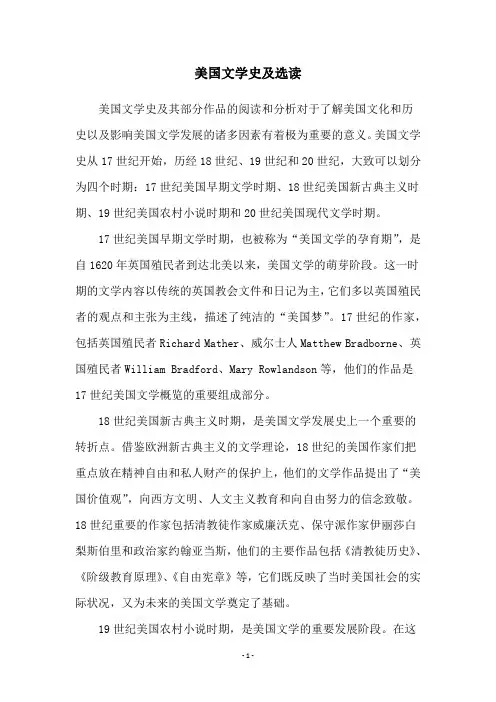
美国文学史及选读美国文学史及其部分作品的阅读和分析对于了解美国文化和历史以及影响美国文学发展的诸多因素有着极为重要的意义。
美国文学史从17世纪开始,历经18世纪、19世纪和20世纪,大致可以划分为四个时期:17世纪美国早期文学时期、18世纪美国新古典主义时期、19世纪美国农村小说时期和20世纪美国现代文学时期。
17世纪美国早期文学时期,也被称为“美国文学的孕育期”,是自1620年英国殖民者到达北美以来,美国文学的萌芽阶段。
这一时期的文学内容以传统的英国教会文件和日记为主,它们多以英国殖民者的观点和主张为主线,描述了纯洁的“美国梦”。
17世纪的作家,包括英国殖民者Richard Mather、威尔士人Matthew Bradborne、英国殖民者William Bradford、Mary Rowlandson等,他们的作品是17世纪美国文学概览的重要组成部分。
18世纪美国新古典主义时期,是美国文学发展史上一个重要的转折点。
借鉴欧洲新古典主义的文学理论,18世纪的美国作家们把重点放在精神自由和私人财产的保护上,他们的文学作品提出了“美国价值观”,向西方文明、人文主义教育和向自由努力的信念致敬。
18世纪重要的作家包括清教徒作家威廉沃克、保守派作家伊丽莎白梨斯伯里和政治家约翰亚当斯,他们的主要作品包括《清教徒历史》、《阶级教育原理》、《自由宪章》等,它们既反映了当时美国社会的实际状况,又为未来的美国文学奠定了基础。
19世纪美国农村小说时期,是美国文学的重要发展阶段。
在这一时期,美国作家把故事的叙事形式从传统的宗教题材变为市井题材,以此表达自己的政治观点,阐释自由主义的价值观。
19世纪重要的作家包括约翰梅尔维尔、欧文梅西尔、温斯顿查尔斯等,他们的作品带来了一股美国游牧主义精神,许多作品以穷乡僻壤为背景,如《黑市交易》、《横行霸道》等,表现了新美国社会的分层现象,探讨了社会动荡及人性苦恼。
20世纪美国现代文学时期,是受到欧洲新派和美国当代艺术的影响,美国文学进入了一个新的阶段,这一时期以诗歌、小说、戏剧、散文等文学形式表现当时美国人的思想感情。

美国文学史梗概一、殖民地时代和美国建国初期最早来自这片新大陆的欧洲移民主要是定居在新英格兰的清教徒和马萨诸塞的罗马天主教徒,二者虽然在教义上有很多不同之处,但他们都信奉加尔文主义:人生在世只是为了受苦受难,而他们唯一的希望是争做上帝的“选民”,死后进天国,相信“原罪”。
这时的文学作品也主要反映了这些思想,和欧洲文学一脉相承。
代表作家:考顿·马瑟,乔纳森·爱德华兹,安妮·布拉兹特里特,爱德华·泰勒。
二、18世纪独立战争胜利后,美国经济社会进入稳步发展时期这一时期是启蒙运动时期(the Enlightenment),从字面上讲,启蒙运动就是启迪蒙昧,反对愚昧主义,提倡普及文化教育的运动。
但就其精神实质上看,它是宣扬资产阶级政治思想体系的运动,并非单纯是文学运动。
它是文艺复兴时期资产阶级反封建、反禁欲、反教会斗争的继续和发展,直接为一七八九年的法国大革命奠定了思想基础。
启蒙思想家们从人文主义者手里进一步从理论上证明封建制度的不合理,从而提出一整套哲学理论,政治纲领和社会改革方案,要求建立一个以“理性”为基础的社会。
他们用政治自由对抗专制暴政,用信仰自由对抗宗教压迫,用自然神论和无神论来摧毁天主教权威和宗教偶像,用“天赋人权”的口号来反对“君权神授”的观点,用“人人在法律面前平等”来反对贵族的等级特权,进而建立资产阶级的政权。
是欧洲第二次思想解放运动。
)主要文学指导思想是“自然神论”(Deism),这个思想认为虽然上帝创造了宇宙和它存在的规则,但是在此之后上帝并不再对这个世界的发展产生影响。
自然神论反对蒙昧主义和神秘主义,否定迷信和各种违反自然规律的“奇迹”;认为上帝不过是“世界理性”或“有智慧的意志”;上帝作为世界的“始因”或“造物主”,它在创世之后就不再干预世界事务,而让世界按照它本身的规律存在和发展下去;主张用“理性宗教”代替“天启宗教”。
人生在世,不再是受苦受难以换取来世的新生,而是要消灭种族、性别和信仰的不平等,建立自己的“人间乐园”。
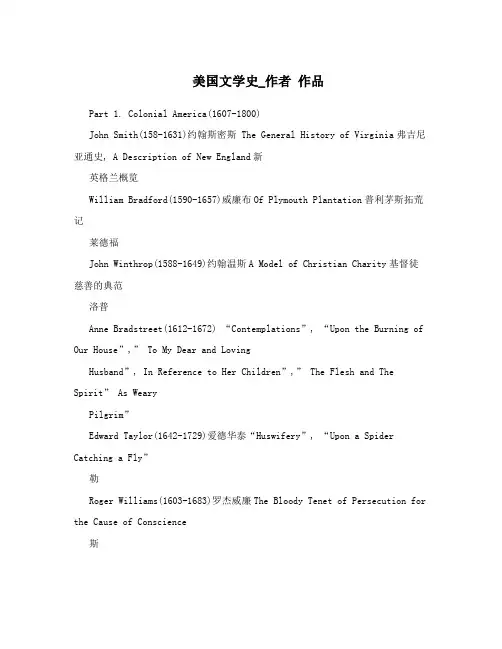
美国文学史_作者作品Part 1. Colonial America(1607-1800)John Smith(158-1631)约翰斯密斯 The General History of Virginia弗吉尼亚通史, A Description of New England新英格兰概览William Bradford(1590-1657)威廉布Of Plymouth Plantation普利茅斯拓荒记莱德福John Winthrop(1588-1649)约翰温斯A Model of Christian Charity基督徒慈善的典范洛普Anne Bradstreet(1612-1672) “Contemplations”, “Upon the Burning of Our House”,” To My Dear and LovingHusband”, In Reference to Her Children”,” The Flesh and The Spirit” As WearyPilgrim”Edward Taylor(1642-1729)爱德华泰“Huswifery”, “Upon a Spider Catching a Fly”勒Roger Williams(1603-1683)罗杰威廉The Bloody Tenet of Persecution for the Cause of Conscience斯John Woolman(1720-1772) “Some Considerations on the Keeping of Negroes”, A Plea for the Poor” Thomas Paine(1737-1809) The Case of the Officers of Excise税务员问题;Common Sense常识;AmericanCrisis美国危机;Rights of Man人的权利:Downfall of Despotism专制体制的崩溃;The Age of Reason理性时代Philip Freneau(1752-1832) The Rising Glory of America;The British Prison Ship英国囚船;To the Memoryof the Brave Americans纪念美国勇士-----同类诗中最佳;The Wild Honeysuckle野生的金银花;The Indian Burying Ground; The Dying Indian: Tomo Chequi Charles Brockden Brown(1771-1810) Wieland; Edgar Huntly; Ormond; Arthur MervynJonathan Edwards(1703-1758)爱德华The Freedom of the Will《意志的自由》 The Great Doctrine of Original Sin 兹 defended《原罪说辩》 The Nature of True Virtue真美德的性质; Images orShadows of Divine Things《神灵的形影》;” Personal Narrative”; “Sinners in theHands of an Angry God”愤怒的上帝手中之罪人Benjamin Franklin(1706-1790) Poor Richard?s Almanac穷查理历书;The Way to Wealth致富之道;TheAutobiography 自传Hector St.John de Crevecour Letters form an American Farmer来自美国农夫的信(1735-1813)克里夫古尔Part 2. American Romanticism(1800-1860)Washington Irving华盛顿?欧文A History of New York from the Beginning of the World to the End of the Dutch 1783-1859 Danasty;纽约外史 ;The Sketch Book of Geoffrey Crayon, Gent见闻札记;The History of the Life and Voyages of Christopher Columbus哥伦布传;AChronicle of the Conquest of Granada格拉纳达征服编年史; The Alhambra 阿尔罕布拉; Life of Goldsmith戈尔德斯密传; Life of Washington华盛顿传; “RipVan Winkle”; “The Legend of Sleepy Hollow”;”The Authors Account ofHimself”James Fennimore Cooper詹姆斯?费The Spy间谍;The Pilot领航者; Leatherstocking Tales皮裹腿故事集:The 尼莫尔?库珀1789-1851 Pioneer拓荒者;The Last of the Mohicans最后的莫希干人;The Prairie大草原;The Pathfinder探路者;The Deerslayer杀鹿者Part 3.New England Transcendentalism(1836-1855)Ralf Waldo Emerson拉尔夫?沃尔Essays散文集:Nature(1836) -----the Manifesto( Bible) of the New England 多?爱默生1803-1882 Transcendentalism;” The American Scholar-----America?s Declaration of Intellectual Independence; “The Poet”; Representative Men代表人物;EnglishTraits英国人的特征;Henry David Thoreau亨利?大卫?梭Walden, or Life in the Woods; 瓦尔登湖“ Civil Disobedience”; “A Plea for 罗1817-1862 John Brown”; A Week on the Concord and Merrimack Rivers;1Amos Bronson Alcott(1799-1888)Margaret Fuller(1810-1850) :《1843年的湖光夏日》(Summer on the Lakes in 1843)(1844)和《论文学与艺术》(Papers on Literature and Art)(1846)。
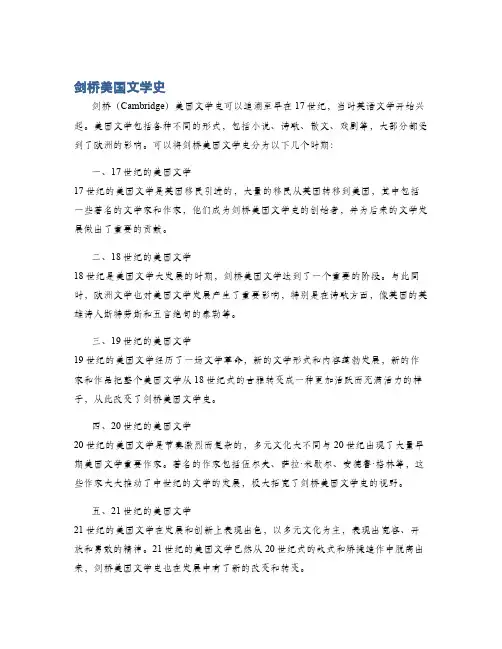
剑桥美国文学史
剑桥(Cambridge)美国文学史可以追溯至早在17世纪,当时英语文学开始兴起。
美国文学包括各种不同的形式,包括小说、诗歌、散文、戏剧等,大部分都受到了欧洲的影响。
可以将剑桥美国文学史分为以下几个时期:
一、17世纪的美国文学
17世纪的美国文学是英国移民引进的,大量的移民从英国转移到美国,其中包括一些著名的文学家和作家,他们成为剑桥美国文学史的创始者,并为后来的文学发展做出了重要的贡献。
二、18世纪的美国文学
18世纪是美国文学大发展的时期,剑桥美国文学达到了一个重要的阶段。
与此同时,欧洲文学也对美国文学发展产生了重要影响,特别是在诗歌方面,像英国的英雄诗人斯特劳斯和五言绝句的泰勒等。
三、19世纪的美国文学
19世纪的美国文学经历了一场文学革命,新的文学形式和内容蓬勃发展,新的作家和作品把整个美国文学从18世纪式的古雅转变成一种更加活跃而充满活力的样子,从此改变了剑桥美国文学史。
四、20世纪的美国文学
20世纪的美国文学是节奏激烈而复杂的,多元文化大不同与20世纪出现了大量早期美国文学重要作家。
著名的作家包括伍尔夫、萨拉·米歇尔、安德鲁·格林等,这些作家大大推动了中世纪的文学的发展,极大拓宽了剑桥美国文学史的视野。
五、21世纪的美国文学
21世纪的美国文学在发展和创新上表现出色,以多元文化为主,表现出宽容、开放和勇敢的精神。
21世纪的美国文学已然从20世纪式的故式和矫揉造作中脱离出来,剑桥美国文学史也在发展中有了新的改变和转变。
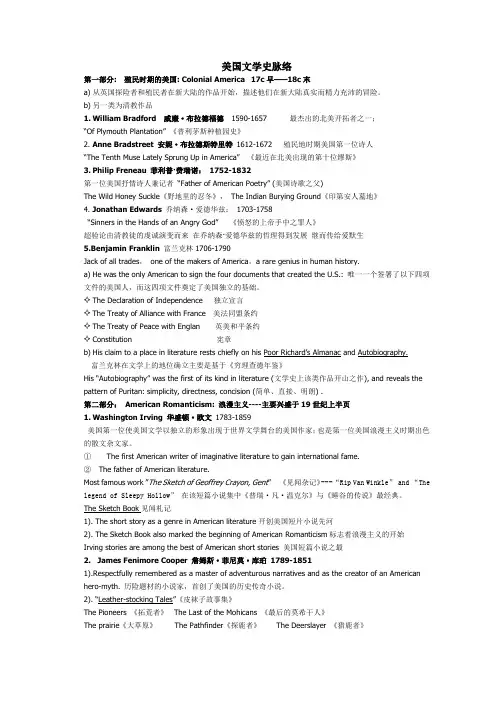
美国文学史脉络第一部分: 殖民时期的美国: Colonial America 17c早——18c末a)从英国探险者和殖民者在新大陆的作品开始,描述他们在新大陆真实而精力充沛的冒险。
b)另一类为清教作品1.William Bradford 威廉·布拉德福德1590-1657 最杰出的北美开拓者之一;“Of Plymouth Plantation”《普利茅斯种植园史》2.Anne Bradstreet 安妮·布拉德斯特里特1612-1672殖民地时期美国第一位诗人“T he Tenth Muse Lately Sprung Up in America”《最近在北美出现的第十位缪斯》3.Philip Freneau 菲利普·费瑞诺:1752-1832第一位美国抒情诗人兼记者“Father of American Poetry” (美国诗歌之父)The Wild Honey Suckle《野地里的忍冬》,The Indian Burying Ground《印第安人墓地》4.Jonathan Edwards乔纳森·爱德华兹:1703-1758“Sinners in the Hands of an Angry God”《愤怒的上帝手中之罪人》超验论由清教徒的虔诚演变而来在乔纳森·爱德华兹的哲理得到发展继而传给爱默生5.Benjamin Franklin富兰克林1706-1790Jack of all trades,one of the makers of America,a rare genius in human history.a)He was the only American to sign the four documents that created the U.S.: 唯一一个签署了以下四项文件的美国人,而这四项文件奠定了美国独立的基础。
✧The Declaration of Independence 独立宣言✧The Treaty of Alliance with France 美法同盟条约✧The Treaty of Peace with Englan 英美和平条约✧Constitution 宪章b)His claim to a place in literature rests chiefly on his Poor Richard’s Almanac and Autobiography.富兰克林在文学上的地位确立主要是基于《穷理查德年鉴》His “Autobiography” was the first of its kind in literature (文学史上该类作品开山之作), and reveals the pattern of Puritan: simplicity, directness, concision (简单、直接、明朗) .第二部分:American Romanticism: 浪漫主义----主要兴盛于19世纪上半页1.Washington Irving 华盛顿·欧文1783-1859美国第一位使美国文学以独立的形象出现于世界文学舞台的美国作家;也是第一位美国浪漫主义时期出色的散文杂文家。

美国文学史及选读
美国文学史及选读,作为一个有数百年歷史的文学流派,有许多伟大的作家,他们的作品塑造了美国文学的发展;最具有代表性的作者是乔治·梭罗,他的作品集中反映了美国社会和人文的发展;詹姆斯·菲茨杰拉德则有其独特的写作风格,表现出美国南方独特的生活理念;现代作家斯蒂芬·金则反映了现代社会的变化,以及老百姓们的故事;另外,特洛伊·萨索洛也有许多优秀的作品,如《失落的一代》,这部作品讲述了美国父辈们如何在战争中战胜同时又被战争毁灭了的故事。
此外,美国20世纪文学也有许多精彩作品,如厄休拉·哈里斯的《百年孤独》就反映了拉美社会发展的全貌;乔纳森·艾默生的《小妇人》描述了美国南方小镇的现实生活;詹姆斯理查德森的《春风沉醉的晚上》赢得了普利策奖,描述了一系列发生在美国农村的故事;克莱尔·麦卡锡更是凭借其《麦田里的守望者》荣膺诺贝尔文学奖,这本书反映了美国童年的美好。
当然,美国文学史不仅体现在各种优秀作品上,它生动有趣的故事也吸引了很多读者,如詹妮弗·洛夫的《歿日的比萨店》等,这些作品彰显着美国文学史所流行的特点:思想作家们对美国文化、宗教、历史和社会的深刻观察,以及深入探讨人性、价值和价值观念。
可以说,美国文学史和各种优秀作品是美国历史发展和发展潮流的最初考验,也是美国文学君主制以及点明美国道路的象征。
总而言之,美国文学史及选读有助于人们更好地了解美国文学,了解美国社会历史、文化现象,增进现代人的文化觉悟。
![[指南]美国文学简史](https://uimg.taocdn.com/d62f9c3e905f804d2b160b4e767f5acfa0c78355.webp)
美国文学简史一、十九世纪以前美国是一个年轻的国家。
作为一个国家,它的历史只能从1776 年7 月4 日算起。
作为历史中一个不可分割的组成部分的美国文学史,严格地说,也是从这一天开始谱写的。
哥伦布在1492 年发现新大陆之前,这块土地的主人是印第安人,他们的各个部落还处在原始公社制度各个不同的发展阶段,他们本身并没有发达的文学。
遭到殖民主义者的野蛮屠杀和驱赶之后,这个种族已处于濒临灭绝的境地,仅有的口头创作也几乎完全中断。
美国独立以前,北美大陆受欧洲人统治长达几个世纪。
由于残酷的殖民经治以掠夺财富和剥削廉价劳力为目的,因此,北美大陆既没有发达的经济,更没有发达的文化。
从这个意义上说,美利坚民族的文化,实际上是欧洲文化的移植,文学和艺术绝大数是欧洲的舶来品。
殖民地时期美国仅有的几位诗人和民间作家,由于历史条件的局限和自身生活的局限,也没有能写出具有美洲特色的作品。
独立之后,美国的文学虽然还处于襁褓之中,但它已经开始摆脱殖民文化的桎梏。
在民族独立的历史关头,美国人民,特别是作为当时站在革命斗争最前列的资产阶级左翼分子,已经认识到了建立民族文学的重要性。
一批年轻的诗人就曾预言,美国文学必将有一个灿烂的未来;他们满腔热情地为这个未来的灿烂文学增砖添瓦,贡献自己的聪明才智。
尽管如此,独立以后相当长的一段时间里,美国还不能很快摆脱在文化上依附英国的状况,不利于民族文学繁荣发展的条件依然存在。
首先,在取得政治上的统一以后,各地区在经济、文化上的发展并不平衡。
当时西部大部分还是处女地,那里除了民间故事外,一时还不可能出现反映西部开发业迹的成熟作品。
在愚昧落后的南部,真正的民族文化无从谈起。
思想意识异常顽固的大不列颠王国的臣民,对这个新生国家总是抱着一种不可名状的仇恨和敌视。
他们鄙视美国的一切,当然也包括美国年轻幼稚的文学。
面对英国的一片嘲笑和挖苦声,已经获得了独立的美国人民决心使自己的国家在政治、经济、文化等各个领域都拥有充分的发言权,他们需要有自己的工业、农业、科学和文化。

美国文学史脉络美国文学是世界文学发展的重要组成部分,其独特的历史和文化背景使得美国文学在世界文坛上有着重要的地位。
美国文学的发展脉络承载着美国国家意识的形成和演变,同时也反映了社会和文化的变迁。
本文将以时间为线索,回顾美国文学的发展历程,并探讨不同时期的代表性作品和文学思潮。
一、殖民地时期(17世纪初-18世纪初)殖民地时期是美国文学的起源阶段。
在这一时期,早期的英国移民带来了宗教、政治和文化的影响,这种影响对后来美国文学的发展产生了深远的影响。
早期殖民地文学的主要形式是宗教文学,代表作品有威廉·布莱德福的《普利茅斯殖民地纪事》和安妮·布拉德斯特里特的《新英格兰纪实》。
二、启蒙时期(18世纪中叶-19世纪初)启蒙时期是美国文学发展的关键时期,这一时期受到了欧洲启蒙运动的影响,同时也受到了美国独立战争和建国过程的影响。
启蒙时期的作家主张人人平等、追求自由和独立,代表作品有托马斯·潘恩的《常识》和本杰明·富兰克林的《自传》。
同时,启蒙时期也涌现了一些重要的政治文学作品,如托马斯·杰斐逊的《独立宣言》和詹姆斯·麦迪逊、亚历山大·汉密尔顿、约翰·杰伊等人的《联邦党人文集》。
三、浪漫主义时期(19世纪中叶-19世纪末)浪漫主义时期是美国文学的黄金时代,这一时期的作家们主张个性主义、独立思考和自然的崇拜。
代表作家有华盛顿·欧文的《睡谷传奇》和爱默生的《自然》。
同时,浪漫主义时期也涌现了大量的诗人,如亨利·沃兹华斯·朗费罗、爱德加·爱伦·坡和怀特曼等人。
这一时期的诗歌作品表达了对自然和个人内心世界的探索,具有强烈的情感色彩和超越现实的思考。
四、现实主义时期(19世纪末-20世纪初)现实主义时期是美国文学发展的转折点,这一时期的作家开始关注社会现实问题,反映工业化和城市化对个人的冲击。
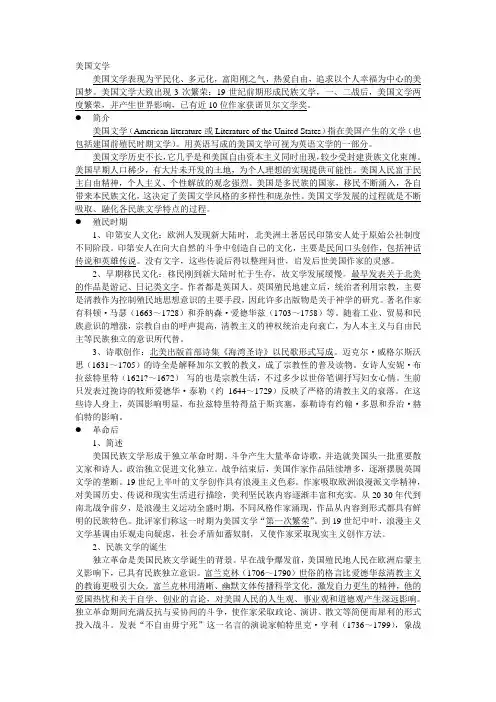
美国文学美国文学表现为平民化、多元化,富阳刚之气,热爱自由,追求以个人幸福为中心的美国梦。
美国文学大致出现3次繁荣:19世纪前期形成民族文学,一、二战后,美国文学两度繁荣,并产生世界影响,已有近10位作家获诺贝尔文学奖。
●简介美国文学(American literature或Literature of the United States)指在美国产生的文学(也包括建国前殖民时期文学)。
用英语写成的美国文学可视为英语文学的一部分。
美国文学历史不长,它几乎是和美国自由资本主义同时出现,较少受封建贵族文化束缚。
美国早期人口稀少,有大片未开发的土地,为个人理想的实现提供可能性。
美国人民富于民主自由精神,个人主义、个性解放的观念强烈。
美国是多民族的国家,移民不断涌入,各自带来本民族文化,这决定了美国文学风格的多样性和庞杂性。
美国文学发展的过程就是不断吸取、融化各民族文学特点的过程。
●殖民时期1、印第安人文化:欧洲人发现新大陆时,北美洲土著居民印第安人处于原始公社制度不同阶段。
印第安人在向大自然的斗争中创造自己的文化,主要是民间口头创作,包括神话传说和英雄传说。
没有文字,这些传说后得以整理问世,启发后世美国作家的灵感。
2、早期移民文化:移民刚到新大陆时忙于生存,故文学发展缓慢。
最早发表关于北美的作品是游记、日记类文字。
作者都是英国人。
英国殖民地建立后,统治者利用宗教,主要是清教作为控制殖民地思想意识的主要手段,因此许多出版物是关于神学的研究。
著名作家有科顿·马瑟(1663~1728)和乔纳森·爱德华兹(1703~1758)等。
随着工业、贸易和民族意识的增涨,宗教自由的呼声提高,清教主义的神权统治走向衰亡,为人本主义与自由民主等民族独立的意识所代替。
3、诗歌创作:北美出版首部诗集《海湾圣诗》以民歌形式写成。
迈克尔·威格尔斯沃思(1631~1705)的诗全是解释加尔文教的教义,成了宗教性的普及读物。
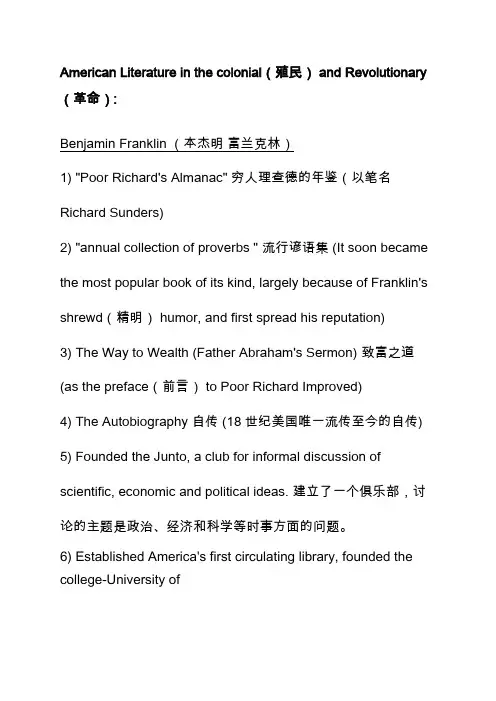
American Literature in the colonial(殖民) and Revolutionary (革命):Benjamin Franklin (本杰明富兰克林)1) "Poor Richard's Almanac" 穷人理查德的年鉴(以笔名Richard Sunders)2) "annual collection of proverbs " 流行谚语集 (It soon became the most popular book of its kind, largely because of Franklin's shrewd(精明) humor, and first spread his reputation)3) The Way to Wealth (Father Abraham's Sermon) 致富之道(as the preface(前言) to Poor Richard Improved)4) The Autobiography 自传 (18世纪美国唯一流传至今的自传)5) Founded the Junto, a club for informal discussion of scientific, economic and political ideas. 建立了一个俱乐部,讨论的主题是政治、经济和科学等时事方面的问题。
6) Established America's first circulating library, founded the college-University ofPennsylvania 建立了美国第一个可租借的图书馆,还创办了一所大学——就是现在的宾夕法尼亚大学7) first applied the terms "positive" and "negative" to electrical (电气) charges.8) Writer, printer, publisher, scientist, philanthropist(慈善家), and diplomat(外交官). He was the most famous and respected private (私人的)figure(人物)of his time.Fhilip Freneau(菲利普费瑞诺)The Rising Glory of America 蒸蒸日上的美洲;The British Prison Ship 英国囚船;To the Memory of the Brave Americans 纪念美国勇士----同类诗中最佳;The Wild Honeysuckle 野生的金银花The Indian Burying Ground 印第安人殡葬地(1)poet and political journalist 诗人和政治方面的新闻记者(2)perhaps the most outstanding writer of the post-revolutionary period(后革命时期).(3)has been called the "Father of American Poetry"(4)imaginative(富有想象力的) and melancholy(忧郁的)treatment of nature and human life, and sharp satire(讽刺)against the British tyranny(暴政)19 Century American LiteratureWashington Irving(华盛顿欧文)1. James Fenimore Cooper(詹姆斯芬尼莫库珀)2. Nathaniel Hawthorne(纳撒尼尔霍桑)3. Edgar Allan Poe (埃德加爱伦坡)4. Henry Daived Thoreau (亨利戴维梭罗)5. Herman Melville(赫尔曼麦尔维尔)6. Walt Whiteman(沃尔特惠特曼)The Rise of American Romanticism(浪漫主义):One of the most important periods in the history of American literature, stretches from the end of the 18th century to the outbreak(爆发) of the Civil War(1861 - 1865)(内战)It started with the publication of Washington Irving's The h Sketch Book(《见闻札记》)(1820) and ended with Whitman's Leaves f of Grass(1855)(《草叶集》)Romanticism 特点 : frequently shared certain general characteristics(特征), moral(道德) enthusiasm(热情), faith(信仰) in the value(价值) of individualism(个人主义) and intuitive(直觉的) perception(洞察力,), and a presumption(假定) that he naturalworld was a source of corruption(腐败).浪漫主义之间大多是相通的,都注重道德,强调个人主义价值观和直觉感受,并且认为自然是美的源头,人类社会是腐败之源。
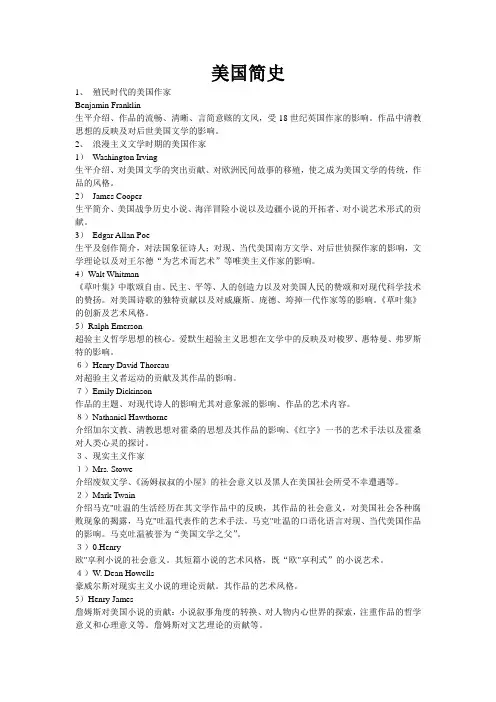
美国简史1、殖民时代的美国作家Benjamin Franklin生平介绍、作品的流畅、清晰、言简意赅的文风,受18世纪英国作家的影响。
作品中清教思想的反映及对后世美国文学的影响。
2、浪漫主义文学时期的美国作家1)Washington Irving生平介绍、对美国文学的突出贡献、对欧洲民间故事的移殖,使之成为美国文学的传统,作品的风格。
2)James Cooper生平简介、美国战争历史小说、海洋冒险小说以及边疆小说的开拓者、对小说艺术形式的贡献。
3)Edgar Allan Poe生平及创作简介,对法国象征诗人;对现、当代美国南方文学、对后世侦探作家的影响,文学理论以及对王尔德“为艺术而艺术”等唯美主义作家的影响。
4)Walt Whitman《草叶集》中歌颂自由、民主、平等、人的创造力以及对美国人民的赞颂和对现代科学技术的赞扬。
对美国诗歌的独特贡献以及对威廉斯、庞德、垮掉一代作家等的影响。
《草叶集》的创新及艺术风格。
5)Ralph Emerson超验主义哲学思想的核心。
爱默生超验主义思想在文学中的反映及对梭罗、惠特曼、弗罗斯特的影响。
6)Henry David Thoreau对超验主义者运动的贡献及其作品的影响。
7)Emily Dickinson作品的主题、对现代诗人的影响尤其对意象派的影响、作品的艺术内容。
8)Nathaniel Hawthorne介绍加尔文教、清教思想对霍桑的思想及其作品的影响、《红字》一书的艺术手法以及霍桑对人类心灵的探讨。
3、现实主义作家1)Mrs. Stowe介绍废奴文学、《汤姆叔叔的小屋》的社会意义以及黑人在美国社会所受不幸遭遇等。
2)Mark Twain介绍马克"吐温的生活经历在其文学作品中的反映,其作品的社会意义,对美国社会各种腐败现象的揭露,马克"吐温代表作的艺术手法。
马克"吐温的口语化语言对现、当代美国作品的影响。
马克吐温被誉为“美国文学之父”。
美国文学史读后感篇一美国文学史读后感嘿,读完美国文学史,我这心里头啊,那叫一个五味杂陈!你说这美国文学史,它就像一个超级大杂烩,啥都有。
从早期的印第安文学,到后来的殖民时期文学,再到现代的各种流派,简直让人眼花缭乱。
我就想啊,也许美国文学的发展就像一场疯狂的冒险。
一开始,那些开拓者们在新大陆上摸索,写下的文字充满了对未知的恐惧和期待。
这就好比我们在黑暗中摸索着前进,心里头没底,但又怀揣着希望,你懂吧?然后呢,随着时间的推移,各种思潮和文化的碰撞,让美国文学变得越来越丰富多彩。
这就好像一个原本素颜的姑娘,慢慢学会了化妆,变得越来越迷人。
不过说真的,我觉得有些作品也太复杂了,读得我脑袋都大了!比如那些象征主义的作品,我看了半天,都不知道作者到底想说啥。
可能是我太笨了,也许是作者故意把话说得云里雾里的。
但也有一些作品,真的能触动到我的内心。
像海明威的小说,那种简洁有力的文字,就像一记重拳,打得我心潮澎湃。
我不禁问自己,为啥人家就能写得这么好呢?总之,读美国文学史,这一路下来,有困惑,有惊喜,有无奈,也有感动。
真不知道该怎么形容,也许这就是文学的魅力吧!篇二美国文学史读后感哇塞,美国文学史,这可真是一本让人又爱又恨的“大书”!刚开始读的时候,我心里还犯嘀咕:这能有意思吗?结果一读进去,嘿,还真被吸引住了。
你瞧,美国文学就像是一个不断成长的孩子。
从一开始懵懵懂懂,到后来逐渐找到自己的方向,这过程多不容易啊!比如说早期的清教徒文学,那简直就是严肃得要命,好像时刻都在告诫人们要守规矩。
我就在想,难道生活就不能有点乐趣吗?可随着时间的流逝,浪漫主义出现了,哇,那感觉就像是给这个孩子穿上了一件五彩斑斓的衣服,一下子变得活泼起来。
那些充满激情和想象的文字,让我仿佛置身于一个梦幻的世界。
不过,这中间也有让我头疼的时候。
有些作家的风格实在是太独特了,我读了好几遍都搞不明白。
难道是我太没文化了?也许是他们的思想太超前,我跟不上节奏?但不得不说,美国文学中的现实主义作品,真的是太真实了,真实得让人有点害怕。
美国文学史概论之二殖民地时期文学殖民地时期文学是美国文学史中的第一个阶段,大约从17世纪初到18世纪末。
这个时期的文学主要以探索者、移民和殖民者的文字为主,所以也被称为“新英格兰文学”或“殖民地文学”。
这段时期的文学作品反映了当时殖民地社会的特点和发展。
在殖民地时期的文学中,最有代表性的作品是宗教文学。
这是因为最早来到新大陆的移民是宗教迫害的受害者,他们来到这里是为了寻求宗教自由。
《普利茅斯纪实》是最早的一部重要作品,它记录了移民者在新大陆上建立普利茅斯殖民地的经历和困难。
这个殖民地后来成为美国的第一批殖民地之一
除宗教文学外,殖民地时期还产生了一些其他类型的文学作品。
其中最重要的是旅行文学,这些文学作品描述了探险者和移民探索和开发新大陆的经历。
《新奥主义银行》是最早的一部重要作品之一,它记录了这个时期英国探险家亨利·哈德森和他的队友在北美洲的探险经历。
此外,殖民地时期的文学还包括了一些诗歌和散文作品。
这些作品主要以抒发个人情感和表达个人意见为主,其中最知名的作家是安妮·布拉德斯特里特。
她的作品《传奇》是美国第一部诗集,被认为是殖民地时期文学中最重要的作品之一
总的来说,殖民地时期文学是美国文学史中的开端,它记录了欧洲移民在新大陆上建立殖民地的经历和困难。
这些作品揭示了当时的社会和文化特点,为后来的美国文学奠定了基础。
美国文学史美国文学作为世界文学中的一支重要力量,具有独特的发展历程和风格。
从殖民地时期开始,美国文学就逐渐形成了自己的特色,逐步走向独立和多元化。
本文将从不同时期和流派的角度,对美国文学史进行探讨。
殖民地文学时期在殖民地时期,北美洲最早由英国、荷兰和法国等欧洲国家殖民,形成了各具特色的殖民地文学。
早期殖民者主要是宗教领袖和移民,他们的文学作品大多与宗教和生活有关。
其中,《普利茅斯纪事》是北美最早的历史文学作品之一,记录了普利茅斯殖民地的建立和发展历程。
独立战争与浪漫主义美国独立战争的胜利为美国文学的繁荣奠定了基础。
浪漫主义在19世纪初发展起来,强调个人主义、自然和民族主义,代表作品有爱默生的《自然》和露易丝·梅·奥尔科特的《小女亨丽特》等。
这一时期的作品多表现出对自由、民主和原生态的向往,具有强烈的思想性和感情色彩。
现实主义和自然主义19世纪中后期,美国文学逐渐发展出现实主义和自然主义两大流派。
现实主义作品关注于社会生活和人性,代表作品有马克·吐温的《哈克贝利·费恩历险记》和亨利·詹姆斯的《彭伯顿夫人》等。
自然主义则更加强调环境和遗传的影响,代表作品有杰克·伦敦的《野性的呼唤》和斯蒂芬·克莱恩的《红字》等。
这一时期的作品在探讨社会问题和人性方面展现出了深度和广度。
现代主义和后现代主义20世纪初,现代主义在美国兴起,表现出对传统文学形式和观念的挑战。
代表作家有欧内斯特·海明威、弗吉尼亚·吴尔芙和威廉·福克纳等,他们的作品多以流畅的叙述和复杂的心理描写为特点。
后现代主义则更加强调对现实的怀疑和对语言的实验,代表作家有托马斯·品钦和唐·德里罗斯等,他们的作品反映出了当代社会的多样性和碎裂性。
结语美国文学历经多个阶段和流派的发展,呈现出了多样的表现形式和思想内涵。
从殖民地时期到现代,美国文学逐渐形成了独具特色的风格和传统。
History And Anthology of American Literature (VolumeⅠ)美国文学史及选读1PartⅠThe Literature of Colonial America殖民主义时期的文学1.17世纪早期European explorers开始登陆美洲。
在他们之前100多年Caribbean Islands, Mexico and other Parts ofSouth America已被the Spanish占领。
2.17th早期English settlements in Virginia and Massachusetts(弗吉尼亚和马萨诸塞)开始了美国历史。
3.美国最早殖民者(earliest settlers)included Dutch ,Swedes ,Germans ,French ,Spaniards ,Italians and Portuguese (荷兰人,瑞典人,德国人,法国人,西班牙人,意大利人及葡萄牙人等)。
4.美国早期文学主要为the narratives and journals of these settlements采用in diaries and in journals(日记和日志),他们写关于the land with dense forests and deep-blue lakes and rich soil.5.第一批美国永久居民:the first permanent English settlement in North America was established atJamestown,Virginia in 1607(北美弗吉尼亚詹姆斯顿)。
6.船长约翰·史密斯Captain John Smith他的作品(reports of exploration)17th早期出版,被认为是美国第一部真正意义上的文学作品in the early 1600s,have been described as the first distinctly American literature written in English.他讲述的内容filled with themes, myths, images, scenes, character and events,吸引了朝圣者和清教徒前往lure the Pilgrims and the Puritans.7.美国第一位作家:1608年Captain John Smith写了封信《自殖民地第一次在弗吉尼亚垦荒以来发生的各种事件的真实介绍》“A True Relation of Such Occurrences and Accidents of Note as Hath Happened in Virginia Since the First Planting of That Colony”.8.他的第二本书1612年《弗吉尼亚地图,附:一个乡村的描述》“A Map of Virginia: with a Description of theCountry”.9.他一共出版了八本书,其中有关于新英格兰的历史及描述。
1620年11月9日,五月花号登陆北美大陆。
普利茅斯殖民地,后并入马塞诸萨州,第一任总督威廉·布拉福德(1590-1657)哈佛学院文学史是关于文学发生、发展、嬗变的历史叙事,文学史以文学创作实践为基础。
不过,文学史不是单纯的文学叙事,还常常是国家叙事。
一方面文学史勾勒出一个国家文学发展的轨迹,总结其文学成就,另一方面也描绘反应国家、民族的整体形象,强化或者反抗一定的意识形态。
文学史写的是过去,关心的却是现在。
写历史总是后人为了自己的需要而去重构过去。
美国在政治上获得独立之后,也试图获得文学上的独立。
当时欧洲人,包括当时的很多美国人,都认为美国根本不存在文学史。
绝大多数美国文人对自己的文学创作都没有信心。
认为美国花去七年时间获得政治上的独立,但是要花掉至少几百年时间才能真正获得文学上的独立。
1888年到1890年间出现的十一卷本《美国文库》也在应证这种信心的缺乏,美国文学只不过是英国文学的一个分支,入选的作品大多是受英国文学影响的新英格兰地区的作家,如欧文,库柏,朗费罗,洛威尔等,而那些具有强烈本土特色的作家不是被剔除,便是轻描淡写。
由特伦特(William Trent)1917年出版的四卷本《剑桥美国文学史》是历史上第一部多人共同编纂的文学史,篇幅之大足见美国文学形成的规模与水平。
尽管书中收入了更多的作家,但是仍然强调把美国文学独立的主张看成是“国民骄傲的诱惑”,强调英美两地虽远隔重洋,却同出一源,使用同样的语言,信仰同样的宗教,都是斯宾塞,莎士比亚,弥尔顿等文学大师熏陶下创作出来的。
但此时,美国文学自主意识有了进一步的觉醒。
批评家范·布鲁克斯(Van Wyck Brooks)在1918年严肃的指出,美国文学的历史在一般人的眼中只是个“没有生命,缺乏价值的过去”,他呼吁人们去发现,甚至去创造一个有意义的美国文学传统。
从1920年开始,美国和加拿大语言和文学界最高学术团体“现代语言协会”开始承认确实有美国文学这么回事。
美国文学史中的各时期作家及代表作品早期的美国文学是从欧洲文学的样式和风格中衍生出来的。
例如,维兰德和查尔斯·布罗克登·布朗的小说创作就是对英格兰哥特小说的模仿。
就连华盛顿·欧文的杰作《李伯大梦》和《沉睡谷传奇》也是十足的欧洲风格,只是故事发生的场景改为美国而已。
美国文学的诞生美国第一位在小说和诗歌创作领域取得显著成就的作家是艾德加·爱伦·坡(1809-1849),他于1835年开始短篇小说的创作,其作品包括《红死病》、《陷坑与钟摆》、《颓败之屋》和《莫尔格街凶杀案》。
他的创作触及了前人很少涉及的心理学领域,并且将神秘、幻想等元素融入小说创作之中。
1837年,年轻的作家纳撒尼尔·霍桑(1804-1864)将他的一些短篇小说集结成册出版,名为《重讲一遍的故事》。
这是一部包含了丰富的象征主义及神秘主义元素的作品。
后来,霍桑又开始写作长篇的传奇小说、类寓言小说,他的本土小说《新英格兰》以人类的内疚、荣耀和情感上的压抑为主题。
霍桑的代表作是《红字》,讲述一个因通奸行为而被驱逐出社区的女人的故事。
霍桑的小说创作对他的朋友,作家赫尔曼·梅尔维尔(1819年-1891年)产生了深远的影响。
赫尔曼·梅尔维尔以自己早期的水手经历为蓝本创作了许多富有异国情调的小说。
在霍桑的影响下,麦尔维尔的小说中也融入了很多哲学上的思索。
在其代表作《白鲸》中,作家通过对一场惊心动魄的捕鲸历程的描述,表达了对人类痴迷状态、人性中罪恶成分以及人类如何战胜这些天性的思索。
在他的另一部短篇杰作《比利·巴德》中,梅尔维尔则戏剧性的描写了战争时期一艘船上人们责任和同情心的主题。
梅尔维尔的那些涵义深远的杰作销量少得可怜,而梅尔维尔本人在有生之年也没有获得应有的声誉。
直到20世纪初期他的作品才重新被人发掘并被给予公正的评价。
1836年,曾经做过联邦政府部长的拉尔夫·沃尔多·爱默生(1803年-1882年)出版了一部散文作品《自然》,主张人类可以通过学习和研究自然世界来代替笃信宗教或试图达到某种玄妙的精神境界。
第一章殖民时期的美国I. American PuritanismThe settlement of North American continent by the English began in the early part of the seventeenth century. The first permanent English settlement in North America was established at Jamestown, Virginia in 1606. In 1620, the ship Mayflower carried about one hundred Pilgrims arrived at Plymouth , Massachusetts. The first settlers in America were quite a few of them Puritans. They came to America out of various reasons. They carried with them American Puritanism which took root in the New World and became the most enduring shaping influence in American thought and American literature.1. Doctrines of PuritanismThe Puritans accepted the doctrine predestination, original sin and total depravity, and limited atonement (or the salvation of a selected few) , which theologian John Calvin had preached.2. The influence of Puritanism on American literature(1) The idealism of Puritan had exerted a great influence on American writers.It is a common place that American literature—or Anglo-American literature—is based on a myth, that is, the Biblical myth of the Garden of Eden. This literature is in good measure a literary expression of the pious idealism of the American Puritan bequest. The Puritan dreamed of living under a perfect order and worked with courage and hope toward building a new Garden of Eden in America, where man could at long last live the way he should. Fired with such a sense of mission, the Puritan looked upon even the worst of life in the face with a tremendous amount of optimism. All this went, in due time, into the making of American literature. The spirit of optimism burst into the pages of so many American authors.(2) The American puritan' s metaphorical mode of perception was chiefly instrumental in calling into being a literary symbolism which is distinctly American.Puritan doctrine and literary practice contributed to no small extent to the development of an indigenous symbolism. To the pious Puritan the physical phenomenal world was nothing but a symbol of God. Every passage of life, en-meshed in the vast context of God 1 s plan, possessed a delegated meaning. It is impossible to overlook the very symbolizing process that was constantly at work in Puritan minds. This process became, in time, part of the intellectual tradition in which American authors were brought up along with their people. For Jonathan Edwards, Emerson, Hacothorne, Melville, Howells and many others, symbolism as a technique has become a common practice. This peculiar mode of perception was an essential part of their upbringing.(3) With regard to technique, the simplicity which characterize the Puritan style of writing greatly influenced the American literature.The style of the writing of the Puritan writers is fresh, simple and direct; the rhetoric is plain and honest, not without a touch of nobility often traceable to the direct influence of the Bible. All this left an indelible imprint on American writing.II. Overview of the colonial literatureAmerican literature grew out of humble origins. Diaries, histories, journals, letters, commonplace books, travel books, sermons, in short, personal literature in its various forms, occupied a major position in the literature of the early colonial period.1. Major writers of colonial period(1) John Smith (1580 -1631)Captain John Smith was one of the founders of the colony Jamestown, Virginia. His writing about North America became the source of information about the New World for later settlers.In The General History of Virginia he wrote about his capture by the Indians and his rescue by the famous Indian Princess, Pocahontas.Another thing he wrote about that became historically important was his description of the fertile and vast new continent in his A Description of New England.(2) William Bradford (1590-1657)In 1620 William Bradford led the Mayflower endeavor and became the first governor of the Plymouth Plantation with his group of Pilgrim Fathers.His major work is Of Plymouth Plantation.(3) John Winthrop (1588-1649)John Winthrop was the first governor of the Massachusetts Bay colony.In his famous speech A Model of Christian Charity he states that “we must consider that we shall be as a city upon a hill, the eyes of all people are upon us.”The two major poets in the colonial period were Anne Bradstreet and Edward Taylor.(4) Anne Bradstreet (1612-1672)Anne Bradstreet was known as the "Tenth Muse" who appeared in America.1. Major worksThe Tenth Muse Lately Sprung Up in AmericaContemplations"Upon the Burning of Our House""To My Dear and Loving Husband"\"In Reference to Her Children""The Fresh and the Spirit""As Weary Pilgrim"2. Analysis of her major works♦Contemplations ( 9 )When the poet heard the grasshopper and cricket sing, she thought of this as their praising of their Creator and searched her own soul accordingly. It is evident that she saw something metaphysical, inhering in the physical, a mode of perception that was singular Puritan.♦ "The Fresh and the Spirit"This poem depicts two sisters arguing about their values. The flesh is forthright with her assertion of her views about the importance of this world while the Spirit, the other, tries to convince her of the greatness of the kingdom of God. The twin sisters are evidently the integral parts of one Puritan mind.(5) Edward Taylor (1642 -1729)Edward Taylor was a Puritan poet, concerned about how his images spoke for God. (X) Analysis of major works♦ " Huswifery"This poem indicates that the poet saw religious significance in a simple daily incident like a housewife spinning. The spinning wheel, the distaff, the flyers, the spool, the reel and the yarn have all acquired a metaphysical significance in the symbolic, Puritan eyes of the poet.♦ " Upon a Spider Catching a Fly"The pet sees the spider as a symbol of Hell. It is obvious that Taylor has faith in God who can save the erring, or sinful, humankind from the evil designs of Hell.(6) Thomas Paine (1737-1809)Thomas Paine was born in England and came to America in 1774. His life was one of continual, unswerving fight for the rights of man. He was a major influence in the American Revolution. (J) Major worksCommon SenseThe American Crisis"The Times that Try Men's Souls"The Rights of ManThe Age of Reason2 Analysis of his major works♦ Common SenseCommon Sense attacked the British monarchy and added fuel to the fire which was soon to bring the colossus of its colonial rule down in flame. Paine declared that the crisis with which the North American colonies were then faced could only be solved by an appeal to man … s instincts and common sense and impulses of conscience. TTie booklet was warmly received in the colonies as a justification for their cause of independence and as an encouragement to the painfully fighting people.♦ the American CrisisThe American Crisis is made up of 16 pamphlets written between 1776 and 1783. The first pamphlet "The Times that TryMen's Souls" came out at one of the darkest moment of the revolution. “ The harder the struggle, the more glorious the triumph," when Washington had it read to the troops, it proved a heartening stimulus, a spurring excitement to further action with hope and confidence.(7) Philip FreneauPhilip Freneau was import an! in American literary history in a number of ways. Apart from the fact that he used his poet-ic talents in the service of a nation struggling for independence, writing verses for the righteous cause of his people and exposing British colonial savageries, he was a most notable representative of dawning nationalism in American literature. Almost alone of his generation, Freneau managed to peer through the pervasive atmosphere of imitativeness, see life directly, and appreciate die natural scenes on the new land and the native Indian civilization.1. Major works"The Wild Honey Suckle""The Dying Indian: Tomo Chequi""The Indian Burying Ground"2. Analysis of major work♦ "The Wild Honey Suckle"In this poem, the lyric beauty, the heartfelt pathos, and the multiple emotional responses and echoes that the sight de-scribed are simply amazing. Here we can see the poet enjoys the beauty that the American landscape is capable of offering. This poem is an indication of the poet‟s dedication of American subject matter.第二章爱德华兹-富兰克林-克里夫古尔American critic Van Wyck Brooks attempted a general survey of eighteen-century America and American characters. He stated that Jonathan Edwards and Benjamin Franklin shared the eighteenth century between them. The American Puritanism is a two-faceted tradition of religious idealism and levelheaded common sense. Jonathan Edwards represents the former aspect, and Franklin the latter. The one was as a good Puritan as the other.I Jonathan Edwards (1703 -1758)1. LifeEdwards was born into a very religious family. He entered Yale at 13 and took his M. A. in 1723. Later He became the minister of the church of Northampton, Massachusetts. His sermons taught the power of God and the depravity of man and man1 s need to communicate with Holy Spirit to receive God1 s grace. He was instrumental in bringing about the "Great Awakening.” He became famous not only in his own country, but won a measure of international recognition as well.2. Ideas(1) He was the first modern American and the country1 s last medieval man.His works reveal the modern consciousness of the man. He was influenced to no small extent by Newton ‟ s mechanical view of the universe and the Lockean thesis. He tried to reconcile Puritan ideas with the new rationalism of Lock and Newton.The same works reveals the medieval mind of the man. He liked to walk in the woods, to be solitary, far from all mankind, so as to sweetly converse with Christ, to be wrapped and swallowed up in God. This is meant by the inward com-munication of soul with god, by "conversation" through the heart rather than through reason.(2) He was a good deal of a transcendentalist.He holds that God is immanent. God manifests himself in nature and man, and that man, being a part of God, is divine. His work Images or Shadow of Divine Things anticipated the nature symbolism of nineteenth-century Transcendentalism. The mystical implication of his Puritan idealism was to be developed and given full, explicit realization by Ralph Waldo Emerson in the next century.3. Major worksThe Freedom of the WillThe Great Doctrine of Original Sin DefendedThe Nature of True Virtue"Sinners in the hands of An Angry God""Personal Narrative"Images or Shadow of Divine ThingII. Benjamin Franklin (1706 - 1790)Franklin was a rare genius in human history. He became everything: a printer, postmaster, almanac maker, essayist, scientist, orator, statesman, philosopher, political economist, ambassador, —"Jack of all trades. "1. LifeHe was born into a poor candle-maker's family. He was a voracious reader. At 16 he published essays under the pseu-donym Silence Dogood. At 17 he ran away to Philadelphia to make his own fortune. He became a printer. He helped found the Pennsylvania Hospital, an academy which led to the University of Pennsylvania, and the American Philosophical Society. He was a preeminent scientist of his day. He signed the Declaration of Independence, the Treaty of Alliance with France, the Treaty of Peace with England, and the Constitution. He was one of the makers of the new nation. Franklin‟s claim to a place in literature rests chiefly on his Poor Richard’ s Almanac and The Autobiography.2. Analysis of major works♦ Poor Richard1 s AlmanacFranklin issued Poor Richard’s Almanac in 1732 and kept publishing it for almost a quarter of a century. Apart from poems and essays, he managed to put in a good many adages and commonsense witticisms which became, very quickly, household words and, for many, mottos of the most practical kind. He borrowed from maxims from others. But he made good use of his own wit and wisdom to simplify and enrich their axioms which made Poor Richard1 s Almanac to teach as well as amuse.♦ The Autobiography(1) The Autobiography was probably the first of its kind in literature. It is the simple yet immensely fascinating record ofa man rising to wealth and fame from a state of poverty and obscurity into which he was born, the faithful account of the colorful career of American " s first self-made man. The book consists of four parts, written at different times.(2) The Autobiography is, first of all, a Puritan document. It is a record of self-examination and self-improvement. The book is also a convincing illustration of the Puritan ethic that, in order to get on in the world, one has to be industrial, frugal and prudent.(3) The Autobiography is also an eloquent elucidation of the fact that Franklin was a spokesman for the new order of eighteenth-century enlightenment, and that he represented in America all its ideas, that man is basically good and free by nature, endowed by God with certain inalienable rights of liberty and the pursuit of happiness. Through telling a success story of self-reliance, the book celebrates the fulfillment of the American dream.(4) The style of The Autobiography reveals that it is the pattern of Puritan simplicity, directness and concision.Hector St John de Crevecoeur (1735-1813)Crevecoeur was a French settler. His famous work is letters from an American Farmer.♦ Analysis of Letters from an American FarmerCrevecoeur wrote letters back to Europe to explain the meaning of America to the outside world. Letters from an Amer-ican Farmer is made up of 12 letters. The first 8 letters reveal the pride of a man being an American. Starting from his ninth letter, he began to speak with a different voice, the voice of a definitely disillusioned man. He became aware of the existence of evil which he thought the American had left behind in the old world. The note of pessimism began to vibrate in Letters from an American Farmer.第三章美国浪漫主义-欧文-库柏Overview of American RomanticismIn the history of American literature, the Romantic period is one of the most important periods. It stretched from the end of the eighteenth century through the outbreak of the civil war.1. Background( 1 ) A nation bursting into new life cried for literary expression. The buoyant mood of the nation and the spirit of the times seemed in some measure responsible for the spectacular outburst of romantic feeling. The literary milieu proved fertile and conductive to the imagination. Magazine appeared in ever-increasing numbers. They played an important role in facilitating literary expansion.(2) Foreign influences added incentive to the growth of romanticism. The Romantic Movement, which had flourished earlier in the century both in England and Europe, proved to be a decisive influence on the upsurge of American romanti-cism.(3) There is American Puritanism as a cultural heritage to consider.2. Characteristics( 1 ) American Romanticism exhibited from the very outset distinct features of its own. It originated from an amalgam of factors that were altogether American rather than anything else. It was in essence the expression of "a real new experi-ence" and contained "an alien quality".( 2) As a logical result of the foreign and native factors at work, American Romanticism was both imitative and inde-pendent.II. Washington Irving (1783 -1859)1. LifeIrving was born into a wealthy New York merchant family. From a very early age he began to read widely and write ju-venile poems, essays and plays. His first book A History of New York was a great success. With the publication of The Sketch Book, he won a measure of international recognition. In 1826 he was sent to Spain as an American diplomatic attache. From 1829 - 1832 he was Secretary of The United States Legation in London. He spent almost the rest of his life at Sunnyside on the Hudson River. He was not married and died in 1859.2. His literary contributionIrving's contribution to American literature is unique in more ways than one. He did a number of things that have been regarded as the first of their kind in America.(1) He was first American writer of imaginative literature to gain international fame.(2) He was the father of American literature. The short story as a genre in American literature probably began with Irving …s The Sketch Book. This book also marked the beginning of American Romanticism.3. Literary careerIrving ‟s career can be roughly divided into two important phases, the first of which spanned from his first book up to 1832, the other stretching over the remaining years of his life.( 1 ) In the first period, most of time, he wrote about subjects either English or European. He found value in the past and in the tradition of the Old World.(2) In the second period, Irving found a whole new spirit of nationalism in American feeling and art and letters.4. Writing styleIrving was a highly skillful writer. The gentility, urbanity , and pleasantness of the man all seem to have adequate ex-pression in his style.( 1) First, Irving avoids moralizing as much as possible; he writes to amuse and entertain.(2) He is good at enveloping his stories in an atmosphere, the richness of which is often more than compensation for the slimness of plot( 3 ) His characters are vivid and true so that they lend to linger in the mind of the reader.(4) The humor has built itself into the very texture of his writings.(5) The finished and musical language and the patent workmanship have been among the points of critical attention.5. Major worksA History of New YorkThe Sketch Book"The Authors Account of Himself""Rip Van Winkle""The Legend of Sleepy Hollow"The history of Life and Voyages of Christopher ColumbusA Chronicle of the Conquest of GranadaLife of GoldsmithLife of WashingtonThe Crayon Miscellany“A Tour on the Prairies"' Astoria"Adventures of Captain Bonneville6-Analysis of major works♦ "Rip Van Winkle"This story reveals the conservative attitude of its author. Before the war, there was peace and harmony. But there comes now the scramble for power between parties and the tempo of life has quickened. The story might be taken as an il-lustration of Irving' s argument that change—and revolution— upset the natural order of things and the fact that Irving never seemed to accept a modem democratic America.♦ "The Legend of Sleepy Hollow‟'The creation of archetypes is a particularly subtle feat of Irving' s consummate craftsmanship. We may see in Ichabod Crane a New Englander, shrewd, commercial, a city-slicker, who is rather an interloper, a somewhat destructive force, in village life, and who comes along to swindle the villagers. He is driven away from where he does not belong, so that the serene village remains permanently good and happy. Brom Bones, on the other hand, is a Huck Finn-type of country bumpkin, tough, vigorous, boisterous but inwardly very good, a frontier type put out there to shift for himself. Thus the rivalry in love between Ichabod and Brom, viewed in this way, suddenly assumes the dimensions of two ethical groups locked in a kind of historic contest.The style of the piece represents Irving at his best.James Fenimore Cooper (1789 -1851)1. LifeCooper was born into a rich land-holding family of New Jersey. He was sent to Yale at 14 but was expelled because of improper behavior. He went and spent five year at sea; In his early twenties, he inherited his father1 s vast fortune and them began to write. His second novel, The Spy, proved to be an immense success. In the three decades that followed, he wrote thirty-odd novels, including eleven of the sea, and a voluminous amount of other writings. He was best known in his own day and is still read and remembered today as the author of Leatherstocking Tales.2. Literary contributionCooper was one of the first authors to write about the American Westward movement Cooper's claim to greatness in American literature lay in the fact that he created a myth about the formative period of the American nation. Cooper wrote with increasing awareness of the importance to Fiction of the Western frontier where, American society may be conceived as passing from one set of principle to another in two directions. Cooper‟ s power lay in his assurance that one direction was morally right and the other practically inevitable. Here lies Cooper1 s conflict of allegiance. He was devoted to the principles of social order and responsible to the idea of nature and freedom in the wildness.3. Writing style( 1 ) Cooper is good at inventing plots. His plots are sometimes quite incredible, but his stories are immensely intriguing.(2) His landscape descriptions are majestic and suggestive of Sir Walter Scott.(3 ) He was quite conscious of the association of different locales. The fact that he had never been to the frontier and among the Indians and yet could write five huge epic books a-bout them which is an eloquent proof of the richness of his imagination. His Indians are among the first appearing in American fiction and probably the first group of noble savages.(4) His style is dreadful. His characterization seems wooden and lacks probability, and his language, his use of dialect, is not authentic.4. Major worksThe SpyLeatherstocking TalesThe Pioneers (1823)The Last of the Mohicans (1826)The Prairie (1827)The Pathfinder (1840)The Deerslayer (1841)5. Analysis of major work♦ Leatherstocking Tales( I) Leatherstocking Tales is a series of five tales about the life of American settlers. The protagonist Natty Bumppo is a mythic figure. When he first appears, we see a real frontiersman, a man of flesh and blood in the virgin forests of North America. But as the story moves on, he does so gathering more and more of the halo of a legendary and mythic nature around him. He becomes a type, a representation of a nation struggling to be born, progressing from old age to rebirth and youth. The Leatherstocking novels go backwards, from old age to golden youth. That is the true myth of America.( 2) The Pioneers is the first of Leatherstocking Tales. Its historical importance lies in the fact that it was probably the first true romance of the frontier in American literature. The basic conflict of the story is, in essence, one between Leather-stocking who insists on man‟s old forest freedom and Judge Temple to whom man remains savage without law and order. Bumppo embodies the idea of brotherhood of man and of nature and freedom, and is morally right. Judge Temple symbolizes law and civilization, and represents the practically inevitable aspect It is between them that they built the wilderness into anything like a civilized place. Hence the plural in the tide of the book, The Pioneers.第四章新英格兰超验主义-爱默生-梭罗In 1836 Emerson‟ s Nature came out which made a tremendous impact on the intellectual life of America. Nature9 s voice pushed American Romanticism into a new phase, the phase of New England Transcendentalism, the summit of American Romanticism.New England TranscendentalismIn the 1830s and 1840s some New Englanders , not quite happy about the materialistic-oriented life of their time, formed themselves into an informal club, the Transcendentalist Club, and met to discuss matters of interest to the life of the nation as a whole. They expressed their views, published their journal, the Dial, and made their voice heard. The club with a membership of some thirty men and a couple of women included Emerson, Thoreau, Branson Alcott, and Margaret Fuller. Most of them were teachers or clergymen, radicals who reacted against the faith of Boston businessmen and the cold, rigid rationalism of Unitarianism. The word " Transcendental" was not native to America; it was a Kantian term denoting, as Emerson put it, "Whatever belongs to the class of intuitive thought n1. Major features( 1 ) The Transcendentalists placed emphasis on spirit, or the Oversoul, as the most important thing in the universe. The Oversoul was an all-pervading power for goodness, omnipresent and omnipotent, from which all things came and of which all were a part. This represented a new way of looking at the world. It was a reaction to the eighteenth Newtonian concept of the universe. It was also a reaction against the direction that a mechanized, capitalist America was taking, against the popular tendency to get ahead in world affairs to neglect spiritual welfare.(2) The Transcendentalists stressed the importance of the individual. To them the individual was the most important element of society. The ideal type of man were the self-reliant individuals. The individual soul communed with the Oversold and was therefore divine. This new notion of the individual and his importance represented a new way of looking at man. It was a reaction against the Calvinist conception of total depravity, against the process of dehumanization that came in the wake of developing capitalism.(3) The Transcendentalists offered a fresh perception of nature as symbolic of the spirit or God. Things in nature tended to become symbolic, and the physical world was a symbol of the spiritual. This in turn added to the tradition of literary symbolism in American literature.2. SourcesNew England Transcendentalism was the product of a combination of foreign influence and the American tradition. ( 1 ) Idealistic philosophy of Germany and France. ( 2) Oriental mysticism. ( 3) American Puritanism.Ralph Waldo Emerson (1803 -1882)I. LifeEmerson was the descendant of a long line of New England clergymen. When he was still a child, the family fortune fell. He went to Harvard. 1ater he embraced Unitarianism and became a Unitarian minister to the Second Church of Boston. But not for long, he found the rationality of Unitarianism intolerable and left his job. He went to Europe and brought back with him the influence of European Romanticism. He formed an informal Transcendentalists1 club with some friends and edited for a time the Transcendentalist journal, the Dial, to explain their ideas. He became the most eloquent spokesman of New England Transcendentalism. During his lifetime he was considered one of the two or three best writers in America, and certainly the most influential among his contemporaries. He was the prophet of his age and exerted great influence on Thor-eau, Whitman, Hawthorne and others in varying degrees.2. Analysis of major works♦ Nature(1)Published in 1836, Nature is generally regarded as the Bible of New England Transcendentalism.(2) In this book, Emerson emphasizes the transcendence of the "Oversoul". He holds the universe is composed of Nature and Soul. He regards nature as the purest, and the most sanctifying moral influence on man, and advocates a direct in-tuition of a spiritual and immanent God in nature.(3) The spiritual God is operative in the soul of man, and that man is divine. The divinity of man became a favorite subject in lectures and essays. Each man should feel the world as his, and the world exists for him alone. Emerson‟ s message was eventually self-reliance. His self-reliance was an expression , on a very high level, of the buoyant spirit of his time. (4) Nature is the emblematic of God. It mediates between man and God. A natural implication of Emerson's view on nature is that the world around is symbolic.♦ "The American Scholar"“The American Scholar” has been regarded as " America … s Declaration of Intellectual Independence, "Emerson tried to say that the Americans should write a-bout here and now instead of imitating and importing from other lands. He called on American writers to write about America in a way peculiarly American. Emerson‟s importance in the intellectual history of America lies in the fact that he embodied a new nation … s desire and struggled to assert its own identity in its formative period.Henry David Thoreau (1917 -1862)1. Life(1)Thoreau was a renowned New England Transcendentalist. He was a friend of Emerson and his junior by some fourteen years. Thoreau was born in Concord, Massachusetts. He went to Harvard at 17. After graduation, he made friends with Emerson and embraced his ideas. In 1845 he moved in a cabin on Walden Pond and lived there in a very simple manner for a little over two years. During his stay in Walden, he went back occasionally to his village, and on one visit he was detained for a night in jail for refusing to pay a poll-tax he thought unjust. This inspired him to write his famous essay, “Civil Disobedience". He wrote about his experience in the famous book, Walden, after he moved back to Concord.He was one of the three great American authors of the nineteenth century who had no contemporary readers and yet became great in the twentieth century, the other two being Herman Melville and Emily Dickinson. And he became a major voice for nineteenth-century America, now better heard perhaps than Emerson‟s. His influence goes l>eyond America. His status was placed in the Hall of Fame in New York in 1969.2. Major WorksA Week On the Concord and Merrimack Rivers Walden"Civil Disobedience" "A Plea for John Brown"3. Analysis of major work♦ WaldenThoreau‟s masterpiece, Walden, is a great Transcendentalist work. It is a faithful record of Thoreau ' s reflections when he was in solitary communion with nature, an eloquent indication that he not only embraced Emerson' s Transcendentalist philosophy but went even further to illustrate the pantheistic quality of nature. Walden can be many things and can be read on more than one level.( I ) It is a book about man, what he is, what he should be and must be. Thoreau holds that the most important thing for men to do with their lives is to be self-sufficient and strive to achieve personal spiritual perfection. Thoreau has been re-garded as a prophet of individualism in American literature.(2) In this book, Thoreau was very critical of modem civilization. Modem civilized life has dehumanized man and placed him in a spiritual quandary.(3) Furthermore, the book is full of ideas expressed to jostle his neighbors out of their smug complacency. He records how he tries to minimize his own needs on Walden Pond. He holds that spiritual richness is real wealth. One's soul might not help one to get up in the world, but it will help make real progress in self-improvement(4) Thoreau went to the woods to experiment a new way of life for himself and for his fellowmen. And he felt that he came out of it a better man, reborn and reinvigorated. Thus, regeneration became a major thematic concern of Walden and it also decided its structural framework.第五章霍桑-麦尔维尔I. Nathaniel Hawthorne (1804 -1864)1. Life。